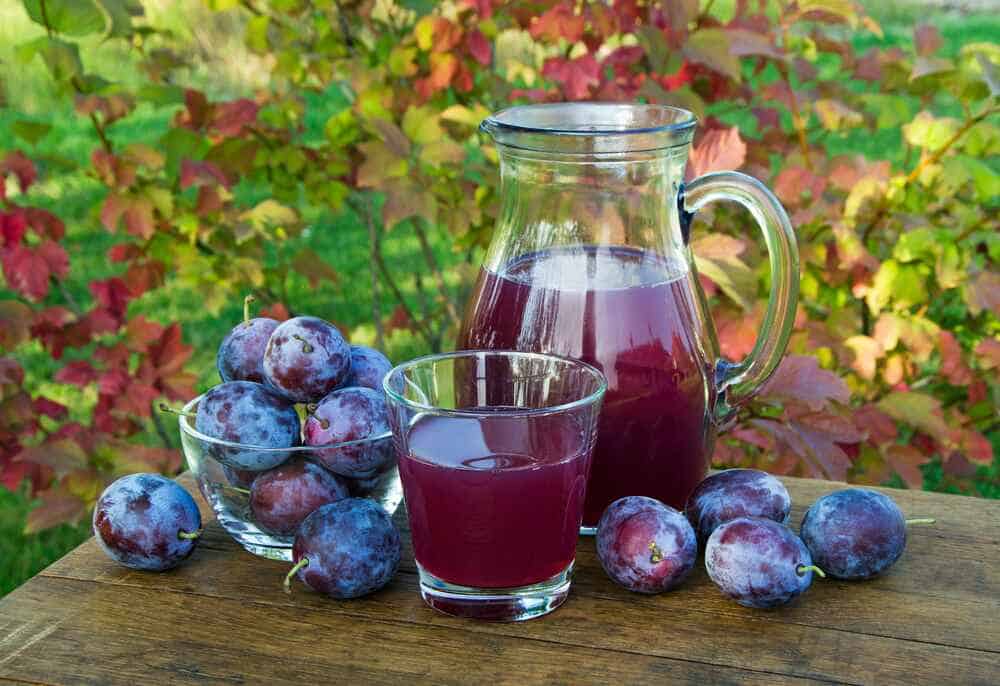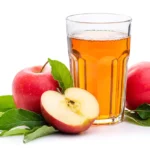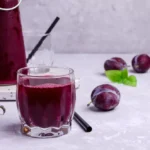Prune juice benefits for skin aren’t just folklore; they’re backed by science and nature’s bounty. In today’s bustling world, maintaining skin health can feel like an uphill battle, besieged by pollution, stress, and poor dietary choices.
However, amidst the chaos, the solution lies in the simplicity of prune juice. Packed with essential nutrients, antioxidants, and hydration, prune juice offers a holistic approach to nurturing and rejuvenating your skin from the inside out. Additionally, a splash of pickle juice can add a zesty twist, providing a burst of flavour and a dose of electrolytes to enhance your overall well-being.
For many, achieving radiant skin seems like an unattainable dream, plagued by issues such as dryness, dullness, and premature ageing. However, incorporating prune juice into your daily routine can be a game-changer. Its high content of vitamin C promotes collagen production, essential for maintaining skin elasticity and firmness, while vitamin E helps protect the skin from oxidative damage, reducing the appearance of fine lines and wrinkles. Additionally, the presence of antioxidants like beta-carotene aids in neutralizing free radicals, thus preventing cellular damage and promoting a youthful complexion. Adding Apple juice to your skincare regimen can further enhance its benefits. Rich in vitamins A and C, apple juice helps hydrate the skin and improve its overall texture, leaving you with a healthy and glowing complexion.
Moreover, prune juice’s hydrating properties help maintain skin moisture levels, combating dryness and flakiness. The presence of potassium aids in regulating cellular fluid balance, promoting supple and plump skin. Regular consumption of prune juice can also help in detoxifying the body, flushing out toxins that may manifest as skin issues such as acne or blemishes. In essence, by harnessing the power of prune juice, you can unlock the secret to glowing, healthy skin naturally.
Everything You Need To Know About Prune Juice

Prune juice might not be everyone’s first choice when it comes to beverages, but let me tell you, it’s got some surprising benefits. Despite its reputation, prune juice is more than just a remedy for digestive issues. Packed with vitamins, minerals, and antioxidants, it offers a range of health perks, from aiding digestion to promoting heart health. So, before you dismiss it as just another old-fashioned drink, consider giving prune juice a second look—it might just surprise you.
Prune juice, derived from dried plums, is a concentrated source of essential nutrients, including vitamins A, B-complex, C, and K, as well as minerals like potassium, magnesium, and iron. It’s also rich in antioxidants, such as beta-carotene and phenolic compounds, which help combat oxidative stress and inflammation in the body.
Despite its high sugar content, prune juice has a relatively low glycemic index, making it a suitable option for those managing blood sugar levels. Additionally, its natural laxative effect due to its high fiber content aids in digestion and promotes regular bowel movements. Regular consumption of prune juice has been linked to improved bone health, reduced cholesterol levels, and even potential anti-cancer properties, making it a versatile and nutritious addition to your diet.
How To Prepare Prune Juice?
As I mentioned adobe, Prune juice is not just a store-bought beverage; it’s a delicious and nutritious elixir that you can easily prepare at home. With just a few simple steps, you can harness the health benefits of prunes and create a refreshing drink that’s bursting with flavour and goodness.
Here’s How to Make Prune Juice at Home:
Ingredients
- 1 cup dried prunes
- 4 cups water
- Optional: sweetener of your choice (such as honey or maple syrup)
Instructions
- Start by placing the dried prunes in a bowl and covering them with water. Allow them to soak for at least 4 hours or overnight. This step helps soften the prunes, making them easier to blend.
- After soaking, transfer the prunes along with their soaking water into a blender. Add 4 cups of fresh water to the blender as well. If you prefer a sweeter juice, you can also add a tablespoon or two of your chosen sweetener at this stage.
- Blend the mixture on high speed until smooth and well combined. If the consistency is too thick for your liking, you can add more water to achieve your desired consistency.
- Once blended, strain the mixture through a fine mesh sieve or cheesecloth into a pitcher to remove any pulp or solids. Press down on the solids with a spoon to extract as much juice as possible.
- Chill the prune juice in the refrigerator for at least an hour before serving. Serve it over ice for a refreshing treat or enjoy it as is for a nutritious boost to your day.
- Store any leftover prune juice in an airtight container in the refrigerator for up to a week. Give it a good shake before serving, as the juice may settle over time.
With this simple homemade recipe, you can enjoy the wholesome goodness of prune juice whenever you like, knowing exactly what’s in it and reaping all the nutritional benefits it has to offer. Cheers to your health!
Health Benefits Of Prunes And Prune Juice

Well, Prunes and prune juice may not be the first thing that comes to mind when thinking about healthy foods, but they’re hiding a treasure trove of benefits! From aiding digestion to supporting heart health, here are five reasons why prunes and prune juice deserve a spot in your diet.
Digestive Health
Prunes are renowned for their natural laxative effect, thanks to their high fiber content. Whether eaten whole or in juice form, prunes can help alleviate constipation and promote regular bowel movements. Plus, they contain sorbitol, a sugar alcohol that draws water into the intestines, further aiding digestion and preventing constipation discomfort.
Antioxidant Powerhouse
Loaded with antioxidants like vitamin C, beta-carotene, and phenolic compounds, prunes and prune juice help combat oxidative stress and inflammation in the body. These antioxidants work together to neutralize harmful free radicals, protecting cells from damage and lowering the risk of chronic diseases like cancer and heart disease.
Heart Health Support
Prunes contain potassium, a mineral essential for heart health. Potassium helps regulate blood pressure by counteracting the effects of sodium and relaxing blood vessel walls. Additionally, the fiber in prunes can help lower cholesterol levels by binding to bile acids and removing them from the body, reducing the risk of heart disease.
Bone Strength
Prunes are rich in vitamin K and boron, two nutrients crucial for bone health. Vitamin K plays a key role in bone metabolism and calcium absorption, while boron helps convert vitamin D into its active form, enhancing calcium uptake and bone mineral density. Regular consumption of prunes may help prevent osteoporosis and maintain strong, healthy bones.
Blood Sugar Regulation
Despite their natural sweetness, prunes have a relatively low glycemic index, meaning they cause a gradual rise in blood sugar levels. This makes them a suitable option for individuals managing diabetes or insulin resistance. Additionally, the fiber content in prunes slows down the absorption of sugar, further stabilizing blood glucose levels and promoting overall metabolic health.
Prune Juice For Children And Infants
So, you might be surprised to hear this, but prune juice isn’t just for grown-ups! Yup, it’s a secret weapon in the parenting arsenal, especially when it comes to keeping your little ones happy and healthy. Prune juice can be a lifesaver for children and infants, helping to ease tummy troubles like constipation thanks to its natural laxative properties.
Plus, it’s packed with essential nutrients like fiber, vitamins, and minerals, which are crucial for their growing bodies. Just a small serving of prune juice can work wonders in keeping your kiddos regular and ensuring they stay nourished. Trust me, as a parent, having prune juice on hand might just save the day when those little bellies need a little extra love!
Should Anyone Avoid Prune Juice?
While prune juice offers numerous health benefits for many people, there are a few situations where it might be best to proceed with caution or avoid it altogether. Individuals with certain medical conditions, such as irritable bowel syndrome (IBS) or inflammatory bowel disease (IBD), may find that prune juice exacerbates their symptoms, such as bloating, gas, or diarrhea, due to its high fiber content and laxative effect.
Additionally, those with a sensitivity or allergy to prunes should steer clear of prune juice to avoid adverse reactions. Since prune juice contains naturally occurring sugars, individuals with diabetes or those closely monitoring their carbohydrate intake should be mindful of their consumption and consider consulting a healthcare professional before adding prune juice to their diet. As with any dietary change, it’s essential to listen to your body and seek guidance from a healthcare provider if you have any concerns or underlying health conditions.
Tips For Buying And Drinking Prune Juice

Ah, so you’re curious about the ins and outs of prune juice? Well, let me spill the beans! When it comes to buying and drinking prune juice, there are a few tricks of the trade to keep in mind. Here are some handy tips from my experience:
Check the Label
When picking out prune juice at the store, take a peek at the label. Look for options with minimal added sugars and preservatives. Opting for organic or 100% pure prune juice ensures you’re getting the real deal without any unnecessary additives.
Start Slow
If you’re new to prune juice or introducing it to your diet, start with small servings. Prune juice packs a powerful punch in the fiber department, so diving in headfirst could lead to some unexpected bathroom trips. Slowly increase your intake over time as your body adjusts.
Stay Hydrated
Since prune juice has a natural laxative effect, it’s essential to drink plenty of water alongside it. Hydration helps keep things moving smoothly and prevents any potential discomfort or dehydration.
Mix it Up
Not a fan of the taste of straight prune juice? No worries! Get creative and mix it into smoothies or use it as a natural sweetener in recipes. You can also dilute it with water or mix it with other juices to tone down the flavor.
Listen to Your Body
Lastly, pay attention to how your body reacts to prune juice. While it offers many health benefits, it’s not for everyone. If you experience any adverse reactions or discomfort, it’s best to scale back or consult with a healthcare professional.
Conclusion
In conclusion, prune juice emerges as a surprising hero in the realm of skincare, offering a natural and effective solution for achieving radiant and healthy skin. With its abundance of vitamins, minerals, and antioxidants, prune juice nourishes and revitalizes the skin from within, combating common issues like dryness, dullness, and premature aging.
By incorporating prune juice into our daily routines, we unlock nature’s secret to glowing skin, embracing its simple yet powerful benefits for a complexion that radiates vitality and beauty.
FAQs
What Relieves Constipation Fast?
Drinking plenty of water and consuming high-fiber foods like prunes or bran can relieve constipation fast.
What Foods Get Rid Of Constipation?
Foods like prunes, apples, and beans are known to help alleviate constipation due to their high fiber content.
What Simple Trick Empties Your Bowels?
Engaging in light exercise, such as walking or stretching, can help stimulate bowel movements and empty your bowels.
What Is A Good Natural Laxative That Works Fast?
A good natural laxative that works fast is consuming a tablespoon of olive oil or aloe vera juice on an empty stomach.
Should You Drink Water After Drinking Prune Juice?
Yes, it’s important to drink water after consuming prune juice to stay hydrated and help facilitate its natural laxative effects.




![Does Pickle Juice Help with Nausea? [ Benefits and Side Effects ] Does Pickle Juice Help with Nausea](https://juicerhunter.com/wp-content/uploads/2023/11/Does-Pickle-Juice-Help-with-Nausea-150x150.webp)

